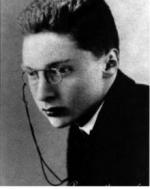Disable ads!
Roman Jakobson
Semiotics General concepts Sign (relation relational complex) Code Confabulation Connotation / Denotation Encoding / Decoding Lexical Modality Representation Salience Semiosis Semiosphere Semiotic elements and sign classes Umwelt Value Fields Biosemiotics Cognitive semiotics Computational semiotics Literary semiotics Semiotics of culture Methods Commutation test Paradigmatic analysis Syntagmatic analysis Semioticians Mikhail Bakhtin Roland Barthes Marcel Danesi John Deely Umberto Eco Algirdas Julien Greimas Félix Guattari Louis Hjelmslev Vyacheslav Ivanov Roman Jakobson Roberta Kevelson Kalevi Kull Juri Lotman Charles S. Peirce Augusto Ponzio Ferdinand de Saussure Thomas Sebeok Michael Silverstein Eero Tarasti Vladimir Toporov Jakob von Uexküll Related topics Copenhagen–Tartu school Tartu–Moscow Semiotic School Post-structuralism Structuralism Postmodernity v t e Roman Osipovich Jakobson (Russian: Рома н О сипович Якобсо н; October 11, 1896 – July 18, 1982) was a Russian–American linguist and literary theorist. As a pioneer of the structural analysis of language, which became the dominant trend in linguistics during the first half of the 20th century, Jakobson was among the most influential linguists of the century. Influenced by the work of Ferdinand de Saussure, Jakobson developed, with Nikolai Trubetzkoy, techniques for the analysis of sound systems in languages, inaugurating the discipline of phonology. He went on to apply the same techniques of analysis to syntax and morphology, and controversially proposed that they be extended to semantics (the study of meaning in language). He made numerous contributions to Slavic linguistics, most notably two studies of Russian case and an analysis of the categories of the Russian verb. Drawing on insights from Charles Sanders Peirce's semiotics, as well as from communication theory and cybernetics, he proposed methods for the investigation of poetry, music, the visual arts, and cinema. Through his decisive influence on Claude Lévi-Strauss and Roland Barthes, among others, Jakobson became a pivotal figure in the adaptation of structural analysis to disciplines beyond linguistics, including anthropology and literary theory; this generalization of Saussurean methods, known as "structuralism", became a major post-war intellectual movement in Europe and the United States. Meanwhile, though the influence of structuralism declined during the 1970s, Jakobson's work has continued to receive attention in linguistic anthropology, especially through the ethnography of communication developed by Dell Hymes and the semiotics of culture developed by Jakobson's former student Michael Silverstein.
 Read more on wikipedia.org Read more on wikipedia.org
 All quotes by Roman Jakobson All quotes by Roman Jakobson
 Edit Edit
|

|
|
|
|
|
Background photo by Giuliana
|